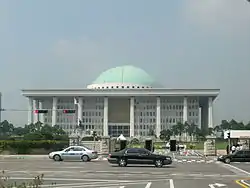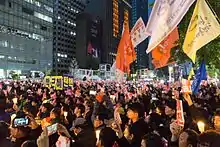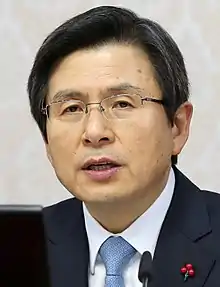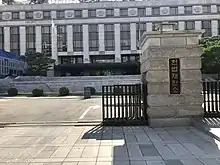Impeachment of Park Geun-hye
The impeachment of Park Geun-hye, President of South Korea, was the culmination of a political scandal involving interventions to the presidency from her aide, Choi Soon-sil. The impeachment vote took place on 9 December 2016, with 234 members of the 300-member National Assembly voting in favour of the impeachment and temporary suspension of Park Geun-hye's presidential powers and duties.[1] This exceeded the required two-thirds threshold in the National Assembly and, although the vote was by secret ballot, the results indicated that nearly half of the 128 lawmakers in Park's party Saenuri had supported her impeachment.[1] Thus, Hwang Kyo-ahn, then Prime Minister of South Korea, became Acting President while the Constitutional Court of Korea was due to determine whether to accept the impeachment. The court upheld the impeachment in a unanimous 8–0 decision on 10 March 2017, removing Park from office. The regularly scheduled presidential election was advanced to 9 May 2017, and Moon Jae-in, former leader of the Democratic Party, was elected as Park's permanent successor.
| Impeachment of Park Geun-hye | |
|---|---|
_(cropped).jpg.webp) | |
| Accused | Park Geun-hye (President of South Korea) |
| Proponents | Woo Sang-ho, Park Jie-won, Roh Hoe-chan |
| Date | 3 December 2016 – 10 March 2017 |
| Outcome |
|
| Charges | Abuse of power, coercion |
| Cause | 2016 South Korean political scandal |
| Impeachment vote by National Assembly (9 December 2016) | |
| Votes in favor | 234 / 300
|
| Votes against | 56 / 300
|
| Present | 2 |
| Not voting | 1 (7 votes invalid) |
| Result | Park impeached and suspended from the presidency for the duration of the impeachment trial; Hwang Kyo-ahn becomes acting president |
| Decision by Constitutional Court of Korea (10 March 2017) | |
| Votes in favor | 8 / 8
|
| Votes against | 0 / 8
|
| Result |
|
| National Assembly: 2004092 Constitutional Court: 2016헌나1 | |
Park was formally sentenced to 24 years in prison on 6 April 2018 after being found guilty of abuse of power and coercion. This was later raised to 25 years and a fine of ₩20 billion (US$17.86 million) following an appeal by prosecutors.[2][3]
Background
South Korean Constitution and Constitutional Court Act

The procedure for impeachment is set out in the 10th Constitution of South Korea in 1987. And according to Article 65 Clause 1, if the President, Prime Minister, or other state council members violate the Constitution or other laws of official duty, the National Assembly can impeach them.
Clause 2 states the impeachment bill must be proposed by one third, and approved by the majority of members of the National Assembly for passage. In the case of the President, the motion must be proposed by a majority and approved by two thirds or more of the total members of the National Assembly, meaning that 200 of 300 members of the parliament must approve the bill. This article also states that any person against whom a motion for impeachment has been passed shall be suspended from exercising his/her power until the impeachment has been adjudicated, and a decision on impeachment shall not extend further than removal from public office. However, impeachment shall not exempt the person impeached from civil or criminal liability for such violations.[4]
By the Constitutional Court Act of 1988, the Constitutional Court must make a final decision within 180 days after it receives any case for adjudication, including impeachment cases. If the respondent has already left office before the pronouncement of the decision, the case is dismissed.[5]
The last president to be subject to impeachment was Roh Moo-hyun, who was impeached by parliament in 2004 and was suspended from duties for two months. In that case, the Constitutional Court of Korea acquitted Roh and restored him to power,[6] with the South Korean public by and large in support of Roh.[7]
Choi Soon-sil scandal

Revelations emerged in late October 2016, that President Park Geun-hye's aide, Choi Soon-sil, who did not have an official position in the government, had used her position to seek donations of money from several business conglomerates (known as chaebol), including Samsung, Hyundai, SK Group and Lotte, to two foundations she controlled.[8][9] These revelations were first revealed when Park's unofficial clothier Ko Young-tae revealed evidence to the media of the nature of Park and Choi's relationship which suggested Choi's access to Park's personal and work life,[10] and Choi was said to have directly influenced, and interfered with the policies of the Park government and to have edited Park's presidential speeches.[11] Media investigations also reported that Choi and President Park's senior staff members, including both Ahn Jong-bum and Jeong Ho-sung, have allegedly used their influence to extort ₩77.4 billion ($60 million) from Korean chaebols—family-owned large business conglomerates—and set up two culture- and sports-related foundations, Mir and K-sports foundations.[12][13][14]
On 25 October 2016, Park apologized to the nation in a televised address from the Blue House for giving Choi access to draft speeches during the first months of her presidency. Protests began on 26 October calling on President Park's resignation. Three days later, she dismissed her top aides including chief of staff Kim Ki-choon and two members of the cabinet and attempted to replace prime minister Hwang Kyo-ahn with Kim Byong-joon, a former aide to former president Roh Moo-hyun, but this was rejected by the National Assembly.
On 31 October, Choi Soon-sil was arrested by prosecutors, having concluded that there was enough evidence for an indictment. She was formally charged with abuse of power and fraud on 20 November.
Park made a second apology on 4 November, pledging to take responsibility if she was found guilty, and a third apology on 29 November, calling for the National Assembly to decide the manner of her departure, but this was rejected by the opposition-controlled legislature. Protests across South Korea began on 26 October with Park's approval rating dropping to 4%, and according to an opinion poll, as of 9 December 78% of South Koreans supported her impeachment.[15] President Park appointed Park Young-soo, former head of the Seoul High Prosecutors' Office, as a special prosecutor to investigate the allegations on 30 November.[16]
Choi's daughter Chung Yoo-ra was also sought by prosecutors as a key witness. When she did not return to Korea for the investigation, an Interpol warrant was put out for her arrest. She was arrested in Denmark on January 1, 2017, and extradited to Korea in May.[17] In late 2016 and early 2017, the German Federal Police began investigating Choi and Chung for money laundering.[18]
The response to the Sewol ferry sinking accident that occurred on 16 April 2014 also contributed to Park's declining presidential ratings.[19]
Political developments
On 3 December 2016, at 4:10 am, Woo Sang-ho of the Democratic Party, Park Jie-won of the People's Party, and Roh Hoe-chan of the Justice Party moved the "President (Park Geun-hye) impeachment proposal" in the National Assembly on behalf of 171 members of their respective parties and other independent representatives, on the grounds that Geun-hye had violated the Constitution and the law.[20] Park's Saenuri Party initially preferred Park to voluntarily step down in late April, but with mounting protests, the ruling party became divided on whether Park should step down voluntarily or be impeached. On 4 December, members of Saenuri's "non-mainstream" factions declared that they would vote in favour of Park's impeachment.[21]
The 300-member National Assembly was scheduled to vote on an impeachment bill on 9 December, at the end of the legislative session. As impeachment against president requires a two-thirds supermajority, at least 200 members would have to vote to impeach, in which case Park would be impeached and immediately suspended from her office. There were up to 172 opposition and independent lawmakers, which meant at least 28 of the 128 MPs from the ruling Saenuri party needed to cross the floor and join the opposition in supporting the impeachment measure for the vote to pass.[15]
Parliamentary motion

On 8 December, the South Korean National Assembly announced that the vote on the motion to impeach would take place on 9 December, at 3:00 pm local time. The opposition parties pledged to resign their seats in the National Assembly if the impeachment motion failed to pass.[22] On 9 December, the National Assembly approved the impeachment motion by a vote of 234 in favour and 56 against in a secret ballot. The Speaker of the National Assembly (who happens to be unaffiliated with any party) abstained from the vote. Two other MPs abstained from voting and seven votes were declared invalid.[23]
| National Assembly Motion to impeach the President (Park Geun-hye) | |
|---|---|
| Two-thirds majority (200/300) required | |
| Choice | Votes |
234 / 300 | |
56 / 300 | |
| Abstention | 2 / 300 |
| Invalid votes | 7 / 300 |
| Did not vote | 1 / 300 |
As a result of the motion's passage, President Park's powers and duties were suspended for up to 180 days while the Constitutional Court of Korea considered the validity of the impeachment motion. It was necessary for six of the nine judges on that court to agree with the impeachment for the removal to take effect.[6]
President Park held a final cabinet meeting acknowledging the impeachment motion and apologised for causing uncertainty, before Prime Minister Hwang Kyo-ahn assumed presidential powers and duties at 19:30 Korean Standard Time, on an interim basis.[24]
Reactions
Protesters congregated outside the National Assembly hall where the voting session was held. Some 40 family members of the victims of the sinking of MV Sewol looked on as lawmakers cast their secret ballots. Citizens who have been rallying in massive numbers against Park rejoiced at the news, while Park's supporters called the parliamentary impeachment a "witch-hunt" without concrete evidence of Park's wrongdoings.[25][26]
On 10 December, hundreds of thousands gathered for a demonstration in celebration of the events.[27]
On 1 January 2017, Park appeared in public for the first time since the impeachment before a select group of reporters at the Blue House, saying she denied any allegations of the scandal and wrongdoings.[28][29]
Constitutional Court hearing and removal from office

The South Korean Constitutional Court had up to 180 days (until early June 2017) to decide on the issue. It held public hearings to hear from both sides on whether the National Assembly had followed due process and the impeachment was justified.[7]
The Constitutional Court has been considered generally conservative, as all nine judges of the Constitutional Court were appointed during the conservative Lee Myung-bak and Park Geun-hye administrations.[30] The Constitutional Court was to start the Preparatory Hearing on 22 December, with initial views from both sides.[31][32]
The first trial focused on the whereabouts of Park Geun-hye seven hours after the Sewol ferry sinking. The administration's delayed response to the disaster led to widespread criticism in South Korea and forced Park to deny various rumours.[33][34] Then, on 23 December the Justice Ministry of South Korea said that it has submitted its views on the recent parliamentary vote to impeach President Park Geun-hye to the Constitutional Court, adding that the process has met all the necessary legal requirements.[35]
The Constitutional Court was to officially start the main hearings on Tuesday, 3 January 2017,[36] and Park would not be required to appear for questioning. Park was absent at the first open hearing and the first session was closed after just nine minutes.[37] The hearings were rescheduled to start on 5 January 2017.[38] The trial heard arguments and evidence until 27 February.[39]
On 6 March, special prosecutor Park Young-soo announced the results of his probe into the Choi and Park allegations, finding evidence of collusion between Park and Choi to solicit bribes from Samsung Group and blacklisting more than 9,000 artists, authors, and movie industry professionals from government assistance that constituted an abuse of power. This opened the possibility of Park's indictment if the Constitutional Court upheld the National Assembly's impeachment motion.[40]
Verdict
.pdf.jpg.webp)

On 10 March 2017, 11.00 am KST, the Constitutional Court upheld the impeachment in a unanimous 8–0 decision read out by Acting Chief Justice Lee Jung Mi which formally ended Park's presidency,[41][42] the first time that a sitting president was removed from the office since the creation of the Sixth Republic of South Korea after the country's democratization in 1987.[6] As supporters and opponents of Park gathered outside the building for the verdict, the ensuing clashes between her supporters and police resulted in injuries, and three of them later died.[43][44][45]
Aftermath
As a result of impeachment, Park was stripped of her post-presidential benefits such as retirement pension, free medical services, state funding for her post-retirement office, personal assistants and a chauffeur, and right to burial at the Seoul National Cemetery after death. However, she is entitled to retain security protection under the Presidential Security Act.[46]
Park left the Blue House on the evening of 11 March and was welcomed to her home by supporters. She was arrested and placed into custody after an indictment by prosecutors on charges of bribery, abuse of power, coercion, and leaking government secrets on 31 March.
After Park's removal from office, Prime Minister Hwang remained as Acting President. A presidential election was already scheduled for December 2017. However, it was advanced to 9 May 2017,[7] as the constitution requires new elections within 60 days of a permanent presidential vacancy. In that election, Moon Jae-in was elected as the 12th president of South Korea.
Plans for a potential military response to protests
In July 2018, it emerged that the Defense Security Command made plans for declaring martial law and authority to use military force to crackdown on protesters, if the Constitutional Court did not uphold Park's removal from office.[47] The DSC had planned to mobilize 200 tanks, 550 armoured vehicles, 4,800 armed personnel, and 1,400 members of special forces in Seoul in order to enforce martial law. Other components of the plan included monitoring and censoring media content and arresting politicians taking part in protests.[48]
References
- Choe Sang-hun (9 December 2016). "South Korea Parliament Votes to Impeach President Park Geun-hye". The New York Times. Retrieved 9 December 2016.
- Euan McKirdy. "South Korea presidential election date announced". CNN. Retrieved 15 March 2017.
- "All the Queen's men and women". The Straits Times. Retrieved 12 May 2017.
- "Constitution of the Republic of Korea". Korean Laws in English. South Korean Ministry of Government Legislation. Retrieved 26 December 2018.
- Umeda, Sayuri (2 December 2016). "South Korea: President May Be Impeached". Library of Congress. Retrieved 25 December 2016.
- "Park Geun-hye: South Korea lawmakers vote to impeach leader". BBC News. 9 December 2016. Retrieved 9 December 2016.
- Park, Ju-min; Kim, Jack (9 December 2016). "South Korean parliament votes overwhelmingly to impeach President Park". Reuters. Retrieved 9 December 2016.
- "South Korea prosecutors: President conspired with her friend". Associated Press. Retrieved 10 December 2016.
- "Prosecutors raid Lotte, SK, finance ministry over Choi scandal". The Korea Times. 24 November 2016. Retrieved 10 December 2016.
- "Park Geun-hye impeached: Did a puppy bring down South Korea's president?". BBC News. 9 December 2016. Retrieved 1 February 2018.
- "South Korea's presidential scandal". BBC News. 9 December 2016. Retrieved 10 December 2016.
- "박 대통령 독대한 대기업들 미르·K 출연금 유독 많았다". The Hankyoreh. 3 November 2016.
- "[단독]"미르-K스포츠재단 모금, 안종범 수석이 지시했다"". news.donga.com.
- "Heads of Samsung, Hyundai and Others Probed Over South Korea Scandal". Fortune. Retrieved 22 January 2017.
- Campbell, Charlie (9 December 2016). "South Korea's Loathed President Park Geun-hye Has Been Impeached". TIME.com. Time. Retrieved 9 December 2016.
- "Park Young-soo named independent counsel for Park Geun-hye Scandal". The Korea Times. 1 February 2018.
- "What we know about Chung Yoo Ra, daughter of key figure in South Korea's corruption scandal involving President Park". The Straits Times. 23 December 2016. Retrieved 2 January 2017.
- "German Police keep investigating Chung Yoo Ra Money Laundering Case in German". MBC. Retrieved 4 January 2017.
- "This could be the week that ends Park Geun-hye's presidency in South Korea". Los Angeles Times. 5 December 2016.
- "South Korean opposition parties introduce bill to impeach scandal-hit President Park Geun-hye". The Independent. 3 December 2016. Retrieved 10 December 2016.
- "South Korean President To Wait For Court's Impeachment Verdict". Yahoo. 6 December 2016.
- "Parlemen Korea Selatan tetapkan Pemakzulan Presiden Park besok". Tempo (in Indonesian). 8 December 2016.
- Joo Youngjae; Huh Namseol (9 December 2016). "[속보] 박근혜 대통령 탄핵소추안 가결···찬성 234·반대 56·무효 7·기권 2". KyungHyang (in Korean). Retrieved 9 December 2016.
- "South Korea's Impeachment Process, Explained". The New York Times. 28 November 2016.
- "Rakyat Korsel Rayakan Pemakzulan Presiden Park Geun-hye". detikcom (in Indonesian). 9 December 2016.
- "Park Geun-hye Impeached". Korea Herald. 9 December 2016.
- "South Koreans rally to celebrate Park ouster". PressTV. Retrieved 10 December 2016.
- "'Totally framed': South Korean President Park Geun-hye denies any wrongdoing, plays down aide's influence". South China Morning Post. Retrieved 1 January 2017.
- "South Korea's Park emerges from seclusion, denies wrongdoing in scandal". Reuters. Retrieved 1 January 2017.
- Ser Myo-Ja; Song Seung-Hwan (10 December 2016). "Politics and public view may influence justices". Korea JoongAng Daily. Retrieved 19 December 2016.
- Divya Kishore (20 December 2016). "South Korea court was held first impeachment trial of Park Geun-hye on 22 December". International Business Times. Retrieved 20 December 2016.
- Choe Sang-hun (22 December 2016). "South Korean Court Begins Hearings on Park Geun-hye's Impeachment". New York Times. Retrieved 30 December 2016.
- Kim Bo-eun (22 December 2016). "President '7 missing Hours' still in mystery". Korea Times. Retrieved 25 December 2016.
- South Korea parliament probes Park's 'missing hours', Al Jazeera (14 December 2016).
- "(LEAD) Justice ministry submits views on impeachment to court". Yonhap News. 23 December 2016. Retrieved 25 December 2016.
- "Court to Start Official Hearings on Park's Impeachment next Tuesday". KBS World. 27 December 2016. Retrieved 27 December 2016.
- "South Korean leader Park absent as impeachment hearing begins". BBC. 3 January 2017. Retrieved 4 January 2017.
- "Park, Choi deny all charges". The Korea Herald. 5 January 2017. Retrieved 5 February 2017.
- "(3rd LD) Court hears final arguments in Park's impeachment trial". Yonhap. 27 February 2017. Retrieved 10 March 2017.
- "South Korea prosecutor paves way for charges against Park if impeachment upheld". Reuters. 6 March 2017. Retrieved 1 February 2018.
- "Park Geun-hye: Court ousts South Korea's scandal-hit president". BBC. Retrieved 10 March 2017.
- Hu, Elise (9 March 2017). "South Korean Judges Uphold President Park Geun-hye's Impeachment". NPR. Archived from the original on 10 March 2017. Retrieved 9 March 2017.
- "Two killed in clashes as South Korea ousts President". Press TV. 10 March 2017. Retrieved 10 March 2017.
- "Park Geun-hye fired as court upholds impeachment".
- Herald, The Korea (11 March 2017). "3rd protester dies as S. Korea braces for more rallies".
- "Park Geun-hye stripped of all presidential perks, to move out of Blue House immediately". asiaone.com. 10 March 2017. Retrieved 1 May 2018.
- "South Korean military planned crackdown on Park protesters". United Press International. 6 July 2018.
- "Plan to activate martial law in South Korea included arrests of lawmakers". EFE. 20 July 2018.